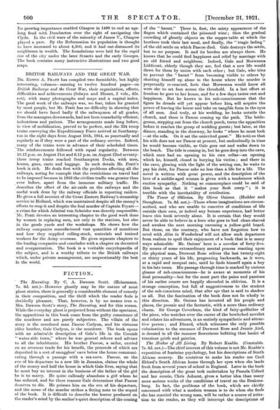BRITISH RAILWAYS AND THE GREAT WAR. MR. EDWIN A. PRATT
has compiled two formidable, but highly interesting, volumes—running to twelve hundred pages on British .Railways and the Great War, their organization, efforts, difficulties and achievements (Selwyn and Blount, 2 vols., 42s. net), with many photographs and maps and a capital index. The good work of the railways was, we fear, taken for granted by most people, but Mr. Pratt has no difficulty in showing that we should have fared badly if the railwaymen of all grades, from the managers downwards, had not been remarkably efficient, industrious and patient. The arrangements made long before, in view of mobilization, proved to be perfect, and the 334 troop trains conveying the Expeditionary Force arrived at Southamp- ton in the eight days from August 10th, 1914, as punctually and regularly as if they were a part of the ordinary service. Indeed, many of the trains were in advance of their scheduled times. The reinforcements followed with equal regularity. Between . 10.12 p.m. on August 21st and 6.12 p.m. on August 22nd seventy- three troop trains reached Southampton Docks, with men, horses, guns, carts and baggage. In such details Mr. Pratt's book is rich. He deals first with the problems affecting all the railways, noting for example that the restrictions on travel had to be imposed because in 1916 the civilian traffic was greater than . ever before, apart from the immense military traffic. He describes the effect of the air-raids on the railways and the useful work done by the railway officials in reporting raiders. He gives a full account of the Great Eastern Railway's steamship service to Holland, which was maintained despite all the enemy's efforts to stop it and despite the foul murder of Captain Fryatt- a crime for which Admiral von Schroder was directly responsible.. Mr. Pratt devotes an interesting chapter to the good work done by women in replacing men, not only in the stations, but also in the goods yards and the workshops. He shows how the railway companies manufactured vast quantities of munitions and how they supplied rolling-stock, materials and trained workers for the Army overseas. He gives separate chapters to the leading companies and concludes with a chapter on decontrol and reorganization. The book is a veritable encyclopaedia of the subject, and is a worthy tribute to the British railways which, under private management, are unquestionably the best in the world.


































 Previous page
Previous page